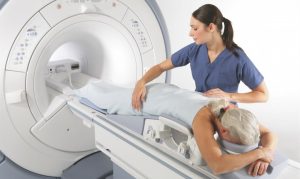
Magnetic Resonance Imaging (MRI) of the Breast: What You Need to Know
The breast magnetic resonance imaging (MRI) (or magnetic resonance imaging - MRI) is a specialized, painless and extremely detailed imaging test that does not use radiation. It is based on a strong magnetic field and radio waves and requires the administration of intravenous contrast agent (gadolinium) for optimal visualization of the breast gland.
When Is Breast MRI Indicated?
Breast MRI is used as a complementary—not routine—examination. It is particularly useful in:
- In women with increased risk of cancer, such as those with a positive family history or are carriers of the BRCA1/BRCA2 genes.
- For him determining the extent of the tumor or tracking multifocal disease.
- To preoperative planning and in monitoring response to neoadjuvant therapy.
- For her monitoring silicone implants.
- In women with extremely dense breast, as auxiliary examination in mammography, to enhance diagnostic sensitivity.
Advantages & Limitations
Magnetic resonance mammography offers high sensitivity identifying lesions that are not apparent on other imaging methods, especially in women with dense breasts. However:
- It is more expensive compared to other tests.
- It may lead to false positive findings, especially in women at average or low risk. This can cause unnecessary biopsies and stress.
How Is the Examination Performed?
The best time to take the test is between 7th and 15th day of the cycle. The process includes:
- Lying face down on a specialized bed that slides into the MRI scanner.
- Careful placement of the breasts in dedicated openings without compression.
- The exam is painless, lasts approx 30 minutes and requires immobility.
- Granted intravenous contrast agent (gadolinium) and metallic sounds are heard during.
Are There Contraindications?
Breast MRI contraindicated in:
- Pregnancy
- Presence of certain metallic implants or devices
- Allergy to contrast agents
- Severe renal impairment
Conclusion
The breast magnetic resonance imaging (MRI) is a specialized and valuable diagnostic tool, especially for high-risk women or complex diagnostic cases. Its use should be determined by a specialized physician as part of a comprehensive breast health management strategy.
At breastaware.gr you will find reliable, evidence-based, and carefully curated information on all breast-related topics — from prevention to diagnosis and treatment.
Bibliography::
- Mann RM, Kuhl CK, Kinkel K, Boetes C. Eur Radiol. 2008;18(7):1307-18.
- Sung JS et al. Radiology. 2021;298(3):516-525.
- Sardanelli F et al. Eur J Cancer. 2010;46(8):1296-316.
- American College of Radiology. ACR Breast MRI Guidelines, 2023.
- Bakker MF et al. N Engl J Med. 2019;381(22):2091-2102.
- Saslow D et al. CA Cancer J Clin. 2007;57(2):75-89.
- Marino MA et al. Top Magn Reson Imaging. 2019;28(4):147-158.
